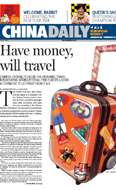Scanners and pat-downs upset airline passengers
Updated: 2010-11-16 14:47
(Agencies)
WASHINGTON - Nearly a week before the Thanksgiving holiday air travel crush, US government air security officials struggled Monday to reassure rising numbers of fliers and airline workers outraged by new anti-terrorism screening procedures they consider invasive and harmful.
Thanksgiving Day, a harvest festival, is the fourth Thursday in November in the United States.
Across the US, passengers simmered over being forced to choose scans by full-body image detectors or probing pat-downs. Top federal security officials said that the procedures were safe and necessary sacrifices to ward off terror attacks.
"It's all about security," Homeland Security Secretary Janet Napolitano said. "It's all about everybody recognizing their role."
Despite officials' insistence that they had taken care to prepare the American flying public, the flurry of criticism from private citizens to airline pilots' groups suggested that Napolitano and other federal officials had been caught off guard.
At the San Diego airport, a software engineer posted an Internet blog item saying he had been ejected after being threatened with a fine and lawsuit for refusing a groin check after turning down a full-body scan. The passenger, John Tyner, said he told a federal Transportation Security Administration worker, "If you touch my junk, I'm gonna have you arrested."
Tyner's individual protest quickly became a web sensation, but questions also came from travel business groups, civil liberties activists and pilots, raising concerns both about the procedures themselves and about the possibility of delays caused by passengers reluctant to accept the new procedures.
"Almost to a person, travel managers are concerned that TSA is going too far and without proper procedures and sufficient oversight," said Kevin Mitchell, chairman of the Business Travel Coalition, an advocacy group representing corporate travel departments. "Travel managers are hearing from their travelers about this virtually on a daily basis."
Jeffrey Price, an aviation professor at Metropolitan State College of Denver, said two trends are converging: the regular holiday security increases and the addition of body scanners and new heightened measures stemming from the recent attempted cargo bombings. Also, several airports are short-staffed, which will add to delays, Price said.
Homeland Security and the TSA have moved forcefully to shift airport screening from familiar scanners to full-body detection machines. The new machines show the body's contours on a computer stationed in a private room removed from the security checkpoints. A person's face is never shown and the person's identity is supposedly not known to the screener reviewing the computer images.
Concerns about privacy and low-level radiation emitted by the machines have led some passengers to refuse screening. Under TSA rules, those who decline must submit to rigorous pat-down inspections that include checks of the inside of travelers' thighs and buttocks. The American Civil Liberties Union has denounced the machines as a "virtual strip search."
Concerns about both procedures are not limited to the US In Germany over the weekend, organized protesters stripped off their clothes in airports to voice their opposition to full-body scans.
Douglas R. Laird, a former security director for Northwest Airlines, said it's the resistance to these measures that will cause the most delays. The new enhanced pat-downs, an alternative to body scanners, take more time _ about 2 minutes compared with a 30-second scan. Delays could multiply if many travelers opt for a pat-down or contest certain new procedures.
Beyond the scanning process, passengers will also be subject to greater scrutiny of their luggage and personal identification and stricter enforcement of long-standing rules like the ban on carry-on liquids over 3 ounces (85.05 grams)1001.
On Monday, top security officials were out in force to defend the new policies. Napolitano wrote an op-ed column in USA Today insisting that the body scanners used at many airports were safe and any images were viewed by federal airport workers in private settings.
Napolitano later said in a news conference at Ronald Reagan National Airport that she regretted the growing opposition to moves by the federal government to make flying safer. But she said the changes were necessary to deal with emerging terrorist threats such as a Nigerian man's alleged attempt to blow up a jetliner bound from Amsterdam to Detroit last Christmas Day using hard-to-detect explosives. Authorities allege that the explosives were hidden in the suspect's underwear.
There are some 300 full-body scanners now operational in 60 US airports. TSA is on track to deploy approximately 500 units by the end of 2010.
Associated Press writers Samantha L. Bonkamp in New York and Robert Jablon and Daisy Ngyuen in Los Angeles contributed to this report.
E-paper

Car sharing helps ease holiday woes
Many car owners offering paid lift services during the Spring Festival rush to reduce their own costs of driving home.
Global marketplace
Right on cue
Welcoming the rabbit
Specials

China Daily in Europe
China Daily launched its European weekly on December 3, 2010.

The Confucius connection
Ancient sage's wisdom helps Chinese students prepare for a more modern, global future.

Welcome the rabbit
Our far-flung writers show how the New Year is celebrated in Australia, India, Malaysia, Australia, Philippines, Singapore, Thailand, Vietnam.
